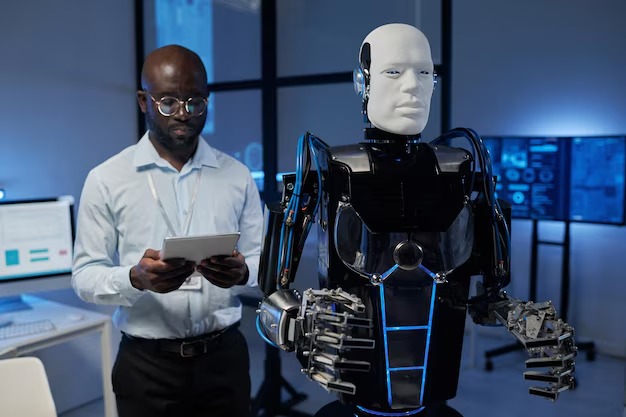The Role of Artificial Intelligence in Business Automation
Published on January 23, 2025

Author: Yiga Richard
In today's fast-paced digital world, businesses are turning to artificial intelligence (AI) to streamline processes, save time, and enhance efficiency. AI-driven automation is revolutionizing industries by minimizing manual tasks, reducing errors, and enabling organizations to focus on strategic growth.
This blog explores the transformative role of AI in business automation, its benefits, and practical applications across industries.
1. What Is Business Automation with AI?
Business automation involves the use of technology to perform repetitive tasks with minimal human intervention. When powered by AI, automation becomes smarter and more adaptive. Unlike traditional automation, which follows predefined rules, AI-powered systems can learn, analyze, and make decisions in real-time, making them highly efficient and scalable.
2. Benefits of AI in Business Automation
a. Time and Cost Savings
AI can handle repetitive tasks such as data entry, customer support, and report generation much faster than humans, freeing up valuable time and reducing labor costs.
b. Improved Accuracy
By minimizing human involvement in tasks prone to errors, AI ensures higher accuracy and consistency, particularly in data processing and compliance-related activities.
c. Enhanced Decision-Making
AI-powered analytics tools provide real-time insights and predictive analysis, empowering businesses to make informed decisions faster.
d. Scalability
AI systems can handle increasing workloads without compromising performance, making them ideal for growing businesses.
e. 24/7 Operations
AI-powered automation tools work around the clock, ensuring uninterrupted operations and faster service delivery.
3. Applications of AI in Business Automation
a. Customer Support
AI chatbots and virtual assistants provide instant, personalized responses to customer inquiries, improving customer satisfaction while reducing the workload on support teams.
b. Human Resources (HR)
AI automates repetitive HR tasks such as resume screening, onboarding processes, and employee performance tracking, allowing HR teams to focus on strategic initiatives.
c. Marketing Automation
AI tools optimize marketing campaigns by analyzing customer behavior, segmenting audiences, and personalizing content to improve engagement and conversion rates.
d. Supply Chain Management
AI enhances supply chain efficiency by automating demand forecasting, inventory management, and logistics planning.
e. Financial Services
In finance, AI automates fraud detection, risk assessment, invoice processing, and expense tracking, ensuring faster and more secure operations.
f. Manufacturing
AI-driven robots and predictive maintenance systems improve production efficiency and reduce downtime in manufacturing processes.
4. Popular AI Tools for Business Automation
- RPA (Robotic Process Automation): Tools like UiPath and Automation Anywhere automate rule-based processes.
- AI Chatbots: Platforms like Zendesk and Intercom provide intelligent customer support solutions.
- Marketing Tools: AI-driven platforms like HubSpot and Marketo help streamline email campaigns, social media, and lead generation.
- Predictive Analytics: Tools like Tableau and Power BI offer insights for data-driven decision-making.
- Document Processing: Optical Character Recognition (OCR) tools like Abbyy automate document handling.
5. Challenges in Implementing AI for Business Automation
While AI offers immense potential, businesses may face certain challenges:
- High Initial Investment: AI implementation requires a significant upfront investment in technology and training.
- Data Quality Issues: AI systems rely on accurate and clean data for optimal performance.
- Resistance to Change: Employees may resist AI adoption due to fears of job displacement.
- Integration Complexity: Integrating AI with existing systems can be technically challenging.
To overcome these challenges, organizations should adopt a phased approach, starting with smaller automation projects, and provide adequate training to employees.
6. Real-World Examples of AI in Business Automation
a. Amazon
Amazon uses AI-powered robots in its warehouses to automate inventory management, reducing operational costs and ensuring fast order fulfillment.
b. Netflix
Netflix leverages AI to analyze user preferences and automate personalized content recommendations, enhancing viewer engagement.
c. PayPal
PayPal employs AI to automate fraud detection, identifying suspicious transactions in real time and ensuring secure payment processing.
7. Future of AI in Business Automation
As AI continues to evolve, its applications in business automation are expected to expand further. Emerging technologies like generative AI, autonomous systems, and advanced natural language processing will open up new possibilities for businesses to optimize their operations and deliver exceptional value to customers.
Conclusion
AI is no longer a futuristic concept—it is a game-changer for businesses looking to automate processes, save time, and enhance operational efficiency. By embracing AI-powered automation, companies can stay competitive, reduce costs, and allocate resources to more strategic endeavors.
The key to successful AI implementation lies in understanding your business needs, starting small, and scaling gradually. Embrace the potential of AI and unlock a new era of productivity and innovation in your organization!